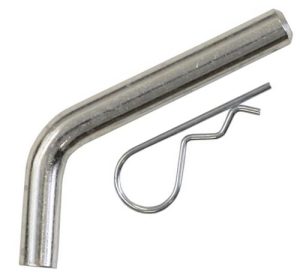
Bent hitch pins make it easy to connect, as well as disconnect, equipment and attachments to vehicles. Also known as R-keys, they are straight on one side and curved on the other side. This unique design allows them to lock into place. You can slide the straight side of a bent hitch pin into the hole of a shaft. Once the curved side reaches the hole, the tension will release. Here are five important things to consider when choosing a bent hitch pin.
#1) Pin Diameter
There’s no such thing as a one-size-fits-all bent hitch pin. Since they are used in holes — typically the holes on shafts — size matters when choosing a bent hitch pin. If it’s too big, it won’t fit. If it’s too small, it may remain loose rather than locking into place. You can avoid problems such as these by checking the pin diameter. The pin diameter represents the diameter of the sides. Some bent hitch pins have a pin diameter of just 0.375 inches, whereas others have a pin diameter of 1 inch.
#2) Material
Bent hitch pins are available in different materials. One of the most common materials used in their construction is steel. Consisting of iron and carbon, steel is a versatile iron alloy that’s prized for its strength and durability. These properties make it an attractive choice for bent hitch pins.
#3) Style
There are different styles of bent hitch pins. Traditionally, bent hitch pins are shaped like the letter R. They feature a straight side and a curved side, the former of which is inserted into a hole. However, there are other styles of bent hitch pins, such as double loop. Double-loop pins live up to their namesake by featuring two loops at the end. In comparison, other bent hitch pins only have a single loop at the end.
#4) Finish
You can find bent hitch pins in different finishes. The finish, of course, consists of an outer protective layer. It’s designed to shield the underlying metal so that corrosion is less likely to occur. Common finishes for bent hitch pins include vinyl and zinc. When coated with a layer of vinyl or zinc, bent hitch pins will be protected from corrosion.
#5) Light, Medium or Heavy Duty
When choosing a bent hitch pin, you should consider the application for which you will use it. There are light-duty, medium-duty and heavy-duty bent hitch pins. Light-duty pins have a relatively low load capacity, whereas medium- and heavy-duty pins have a higher load capacity.
